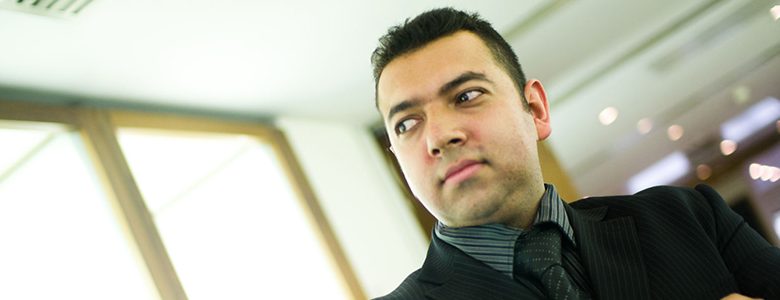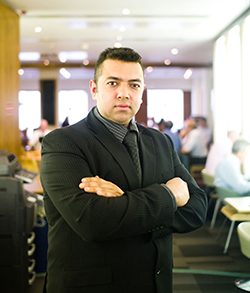
Disability and employment: how to start your own business
Shezad Nawab is a very successful deaf entrepreneur born and raised in Birmingham. At a very early age he showed a passion for business and decided to follow in his fathers footsteps. Since starting out he has helped many new businesses and start-ups get off the ground. Zubee caught up with him to find out more about his journey to success and to find out his tips for those wanting to start their own business.
What motivated you to start your own business?
I am motivated and inspired by my father, who has a strong family background in business. My father took the time to learn basic British Sign Language so we could understand each other and chat about business throughout the years.
How did you set up your business and how can others do the same?
If you want to set up a new business you have to prepare to work for a while with no profit – it takes time so keep going and never give up. As a deaf entrepreneur I face massive barriers to communication, but I try not to let it worry me. You’ve just got to focus on keeping busy and always think about your business strategy, from launch through to development.
Do you think anyone can be successful if they are taught?
I think with the right level of confidence anyone can grow a successful business. Of course it helps if you have support from your family, especially if they are in business and can invest in your business. That also means that you can learn from them.
If you don’t come from that background, you need support from a business mentor. Either way, accept the challenges that the business gives you and have confidence in your business.
What would you say are the key factors you have to consider when starting your own business?
Research, research and more research! It is important to improve your knowledge of the sector you want to work in and understand your competitors. Before I decide to start a business, I research the current market and identify the gaps in that market.
I also meet with people working in that sector. Smooth business transactions depend on good market knowledge – from the start of my initial idea, during the research phase to arranging the budget, launching the business to growth stage and finally to exit strategy.
As a successful business owner what are the biggest lessons you have learnt?
A big lesson I learned early on as an entrepreneur was about the branding of my initial business consultancy service. I named the business Deaf Business Services. I couldn’t understand why my coaching work didn’t take off and then realised that by including the word ‘deaf’ in my branding, that I was confusing people. Unfortunately, many people got the impression that the service was a charitable organisation, so the business didn’t flourish.
I learned that in order to market my services in the mainstream business community I needed to use words and language that they were familiar with. Jargon can often be a barrier. I hadn’t understood my target audience and the website, logo and even the name of the business needed to be changed. I removed the word ‘deaf’ from my branding and re-marketed the service, introducing myself as a deaf entrepreneur and suddenly the business took off! A re-brand rescued the business and turned it into a success.
Can you tell us about some of the challenges that you have had to deal with along the way?
Starting up a new business is not easy. Almost every entrepreneur you meet has had at least one business fail or stall. It’s often a missing element to the business, a problem with the marketing strategy for example. Being an entrepreneur can bring its successes and failures, from my own experience, redevelopment and reorganisation can solve a lot of issues within a business.
 How long did it take you to get your business up and running to where it is now?
How long did it take you to get your business up and running to where it is now?
When I was ten years old, I asked my father how one becomes a millionaire. He was initially worried about me being deaf and using sign language to communicate as this was the biggest barrier I would face throughout my life. I told him I could do it – there was no problem with my confidence!
At that point my father decided I could learn from the family businesses, running a branch of the post office, property development and managing a busy supermarket. When I was 16 years old I secured a job at Birmingham Airport and worked there every summer until I was 20.
Whilst at university, I bought a business in Morocco and planned my first business launch after graduation. I now work as a freelance interim Executive Director and business consultant whilst currently launching a new venture, Lead Tomorrow. I still invest in off market properties and conglomerate ventures and am regularly invited to give presentations at business events.
What have been your proudest achievements?
In August 2008, whilst still at university, I bought and managed a beauty salon in Morocco. The day-to-day running of the business was led by a manager who was deaf, responsible for seven members of staff. The business was extremely successful. After 6 years, an investor offered to buy the business and lease the premises from me, which I accepted as this gave me the time to focus on new businesses ventures.
I have given business advice to over 40 deaf clients in the United Kingdom, Europe and internationally and have received great feedback on my services. I pride myself on giving advice that is valuable, honest, professional and trustworthy.
I am passionate about entrepreneurs and supporting disabled, deaf and hearing people to start up, run and develop their own businesses.
What is the top piece of advice would you give other disabled people looking to start their own business?
Don’t be scared or shy! I highly recommend finding a good business mentor, like the mentors we have sourced at Lead Tomorrow. They can help you with all aspects of setting up your own business. It’s that simple!
What are your top 5 tips for being a successful entrepreneur?
Funding – Manage your money wisely and don’t waste it. Invest the money you would spend socialising into your business. Good investments for the long term future are in gold bar and property. Keep tight control on your finances, make a budget and stick to it.
Looking for a business partner – Don’t rush this! A good business partner should have your complete trust and bring a different set of skills and perspectives to the project.
Pitch your business idea – Creating a good business pitch is very important. A business pitch can last between 1 and 3 minutes and focus on the market return on investments and the financials. Keep it brief and don’t give your life history!
Business plan – Investors won’t read a business plan that is 30 pages long. They prefer a short plan with a maximum of 5 pages and an executive summary at the start.
Business trips – Business is done best when it’s done face-to-face. Take the time to travel in the UK, EU and internationally to discuss products and services and meet with your team. Take time to visit customers approximately every three months. Keep on your mobile switched on and with you at all times! Constantly check your emails and respond as quickly as possible.
If anyone wishes to use your services, how can they get in touch?
I can provide a range of business consulting, from start-up advice to becoming an interim manager, developing your growing business. You can also find me on LinkedIn and follow me on Twitter @ShezadNawab
If you are looking for a speaker or presentation for your next event, please take a look at my previous public speaking engagements via the links above.
By Zubee
Get in touch by messaging us on Facebook, tweeting us @DHorizons, emailing us at editor@disabilityhorizons.com or leaving your comments below.